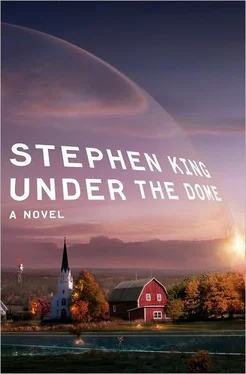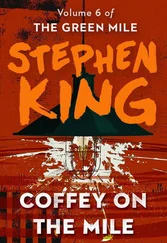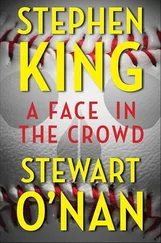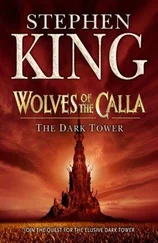Rusty thought of the parents, waiting and hoping against hope. Now, instead of wheeling Rory to the left outside the OR—toward Cathy Russell’s ICU, where his folks might be allowed to creep in and see him—it looked like Rory would be taking a right, toward the morgue.
“If this were an ordinary situation, I’d maintain life support and ask the parents about organ donation,” Haskell said. “But of course, if this were an ordinary situation, he wouldn’t be here. And even if he was, I wouldn’t be trying to operate on him using a… a goddam Toyota manual.” He picked up the otiscope and threw it across the OR. It struck the green tiles, chipped one, and fell to the floor.
“Do you want to administer epi, Doctor?” Ginny asked. Calm, cool, and collected… but she looked tired enough to drop in her tracks.
“Was I not clear? I won’t prolong this boy’s agony.” Haskell reached toward the red switch on the back of the respirator. Some wit—Twitch, perhaps—had put a small sticker there that read BOOYA! “Do you want to express a contrary opinion, Rusty?”
Rusty considered the question, then slowly shook his head. The Babinski test had been positive, indicating major brain damage, but the main thing was that there was just no chance. Never had been, really.
Haskell flipped the switch. Rory Dinsmore took one labored breath on his own, appeared to try for a second one, and then gave up.
“I make it…” Haskell looked at the big clock on the wall. “Five fifteen PM. Will you note that as the TOD, Ginny?”
“Yes, Doctor.”
Haskell pulled down his mask, and Rusty noted with concern that the old man’s lips were blue. “Let’s get out of here,” he said. “The heat is killing me.”
But it wasn’t the heat; his heart was doing that. He collapsed halfway down the corridor, on his way to give Alden and Shelley Dinsmore the bad news. Rusty got to administer epi after all, but it did no good. Neither did closed-chest massage. Or the paddles.
Time of death, five forty-nine PM. Ron Haskell outlived his last patient by exactly thirty-four minutes. Rusty sat down on the floor, his back against the wall. Ginny had given Rory’s parents the news; from where he sat with his face in his hands, Rusty could hear the mother’s shrieks of grief and sorrow. They carried well in the nearly empty hospital. She sounded as if she would never stop.
Barbie thought that the Chief’s widow must once have been an extremely beautiful woman. Even now, with dark circles under her eyes and an indifferent choice of clothes (faded jeans and what he was pretty sure was a pajama top), Brenda Perkins was striking. He thought maybe smart people rarely lost their good looks—if they had good ones to begin with, that was—and he saw the clear light of intelligence in her eyes. Something else, too. She might be in mourning, but it hadn’t killed her curiosity. And right now, the object of her curiosity was him.
She looked over his shoulder at Julia’s car, backing down the driveway, and raised her hands to it: Where you going?
Julia leaned out the window and called, “I have to make sure the paper gets out! I also have to go by Sweetbriar Rose and give Anson Wheeler the bad news—he’s on sandwich detail tonight! Don’t worry, Bren, Barbie’s safe!” And before Brenda could reply or remonstrate, Julia was off down Morin Street, a woman on a mission. Barbie wished he were with her, his only objective the creation of forty ham-and-cheese and forty tuna sandwiches.
With Julia gone, Brenda resumed her inspection. They were on opposite sides of the screen door. Barbie felt like a job applicant facing a tough interview.
“Are you?” Brenda asked.
“Beg your pardon, ma’am?”
“Are you safe?”
Barbie considered it. Two days ago he would have said yes, of course he was, but on this afternoon he felt more like the soldier of Fallujah than the cook of Chester’s Mill. He settled for saying he was housebroken, which made her smile.
“Well, I’ll have to make my own judgment on that,” she said. “Even though right now my judgment isn’t the best. I’ve suffered a loss.”
“I know, ma’am. I’m very sorry.”
“Thank you. He’s being buried tomorrow. Out of that cheesy little Bowie Funeral Home that continues to stagger along somehow, even though almost everyone in town uses Crosman’s in Castle Rock. Folks call Stewart Bowie’s establishment Bowie’s Buryin Barn. Stewart’s an idiot and his brother Fernald’s worse, but now they’re all we have. All I have.” She sighed like a woman confronting some vast chore. And why not? Barbie thought. The death of a loved one may be many things, but work is certainly one of them.
She surprised him by stepping out onto the stoop with him. “Walk around back with me, Mr. Barbara. I may invite you in later on, but not until I’m sure of you. Ordinarily I’d take a character reference from Julia like a shot, but these are not ordinary times.” She was leading him along the side of the house, over nicely clipped grass raked clear of autumn leaves. On the right was a board fence separating the Perkins home from its next-door neighbor; on the left were nicely kept flowerbeds.
“The flowers were my husband’s bailiwick. I suppose you think that’s a strange hobby for a law enforcement officer.”
“Actually, I don’t.”
“I never did, either. Which makes us in the minority. Small towns harbor small imaginations. Grace Metalious and Sherwood Anderson were right about that.
“Also,” she said as they rounded the rear corner of the house and entered a commodious backyard, “it will stay light out here longer. I have a generator, but it died this morning. Out of fuel, I believe. There’s a spare tank, but I don’t know how to change it. I used to nag Howie about the generator. He wanted to teach me how to maintain it. I refused to learn. Mostly out of spite.” A tear overspilled one eye and trickled down her cheek. She wiped it away absently. “I’d apologize to him now if I could. Admit he was right. But I can’t do that, can I?”
Barbie knew a rhetorical question when he heard one. “If it’s just the canister,” he said, “I can change it out.”
“Thank you,” she said, leading him to a patio table with an Igloo cooler sitting beside it. “I was going to ask Henry Morrison to do it, and I was going to get more canisters at Burpee’s, too, but by the time I got down to the high street this afternoon, Burpee’s was closed and Henry was out at Dinsmore’s field, along with everyone else. Do you think I’ll be able to get extra canisters tomorrow?”
“Maybe,” Barbie said. In truth, he doubted it.
“I heard about the little boy,” she said. “Gina Buffalino from next door came over and told me. I’m terribly sorry. Will he live?”
“I don’t know.” And, because intuition told him honesty would be the most direct route to this woman’s trust (provisional though that might be), he added, “I don’t think so.”
“No.” She sighed and wiped at her eyes again. “No, it sounded very bad.” She opened the Igloo. “I have water and Diet Coke. That was the only soft drink I allowed Howie to have. Which do you prefer?”
“Water, ma’am.”
She opened two bottles of Poland Spring and they drank. She looked at him with her sadly curious eyes. “Julia told me you want a key to the Town Hall. I understand why you want it. I also understand why you don’t want Jim Rennie to know—”
“He may have to. The situation’s changed. You see—”
She held up her hand and shook her head. Barbie ceased.
“Before you tell me that, I want you to tell me about the trouble you had with Junior and his friends.”
Читать дальше











